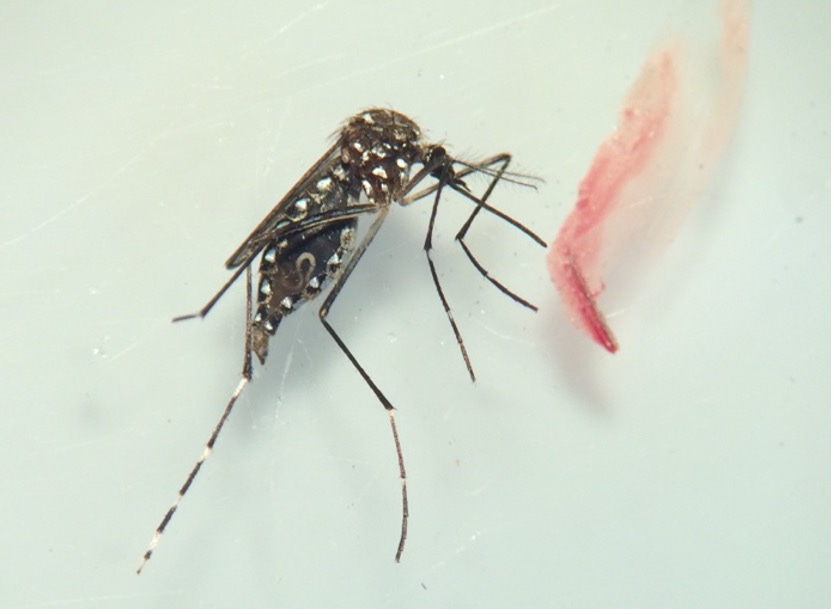Behind the Paper: Unveiling How a Poor Diet Makes Mosquitoes Worse Disease Carriers
Published in Microbiology


Photo: Jiayue Yan
What Did the Researchers Discover?
The scientists studied mosquitoes to see how their diet, both as larvae (in the water) and as adults (on land), affects them. They discovered that when mosquitoes have a lousy diet, they lay fewer eggs, have a shorter lifespan, have a lower immune response, and are more likely to get infected with the dengue virus. This is important because the number of eggs they lay, how long they live, the antiviral immune performance, and their ability to get infected all affect how well they can spread diseases.
How Does Diet Affect Mosquitoes?
Imagine you're a mosquito. If you had a poor diet when you were a young mosquito in the water, you'll grow up to be a smaller adult mosquito with compromised immunity. And smaller mosquitoes are more likely to get sick with dengue. But even as an adult mosquito, your diet matters. If you don't get enough sugar, you're more likely to get infected with the virus.
Why Is This Important?
Understanding how what mosquitoes eat affects their ability to spread diseases is vital. When mosquitoes are in poor shape because of a poor diet, they can be better at transmitting diseases like dengue. This means that strategies to control diseases can focus on things like making sure mosquitoes have fewer places to breed or removing plants that attract them.
What Were the Challenges They Faced During This Research?
Handling a large group of female mosquitoes posed several challenges during the research. They needed to ensure that all adult mosquitoes emerged within a narrow time frame to minimize age differences. Keeping mosquitoes, especially those in the low-sugar group, alive for 24 hours without food was tricky but necessary before giving them a blood meal. The goal was to have at least 50 fully-blood fed mosquitoes for each treatment group. Performing the eight-level experiment in a single day required a careful and intense process. This included handpicking over 400 fully-blood fed mosquitoes and transferring them one by one into 400 handmade cups within a confined space called a glove box. Additionally, they had to closely monitor the survival of 400 post-blood-feeding mosquitoes individually, twice a day, for over three months. To keep the dengue virus fresh, they had to grow it in various cell culture containers, harvest the virus, and prepare a blood meal with the virus for mosquito infection on the same day as the blood-feeding experiments mentioned earlier. This entire process was repeated in a second session.
Any Random Tidbits from This Research?
Jiayue (Gabriel) Yan, the leading author of this work, has somethings interesting to share: “we did four rounds of the entire experiments, each with up to 5,000 mosquito larvae. Our goal was to get enough fully-blood fed female mosquitoes. Sadly, the first and third rounds flopped due to mix-ups of infectious blood meal and a major loss of mosquitoes from low-sugar groups during the fasting period. On the flip side, rounds two and four went smoothly and were the ones they analyzed. Handling these experiments is like walking on eggshells. One small mistake and the whole session goes down the drain, leading us to start all over again. To keep tabs on our blood-fed mosquitoes and track their survival and egg production individually, we crafted over 800 paperboard cups with mesh lids. We have to be extremely careful not to leave any gaps when sealing the top opening with mesh and glue guns. If there's even a small hole, mosquitoes might get out and could cause trouble if they bite someone. So, you can imagine, we handle these experimental mosquitoes with the utmost care throughout our research”.
What's Next?
The study has some limitations. For example, it was done in a lab, not in the real world. Future research should look at mosquitoes in the wild and use different levels of the virus. But this research gives us important insights into how what mosquitoes eat affects their ability to spread diseases. It helps in our fight against diseases like dengue, and that's a big deal for public health.
Follow the Topic
-
Communications Biology

An open access journal from Nature Portfolio publishing high-quality research, reviews and commentary in all areas of the biological sciences, representing significant advances and bringing new biological insight to a specialized area of research.
Related Collections
With Collections, you can get published faster and increase your visibility.
Signalling Pathways of Innate Immunity
Publishing Model: Hybrid
Deadline: Feb 28, 2026
Forces in Cell Biology
Publishing Model: Open Access
Deadline: Apr 30, 2026



Please sign in or register for FREE
If you are a registered user on Research Communities by Springer Nature, please sign in